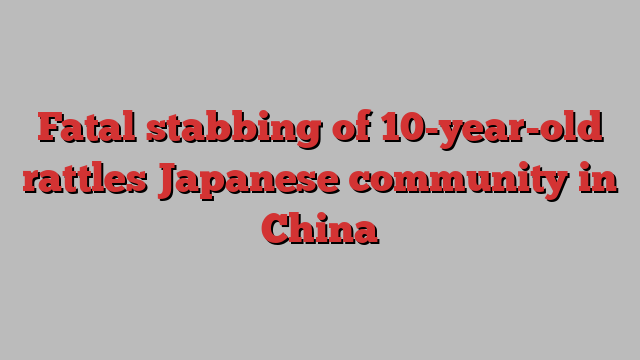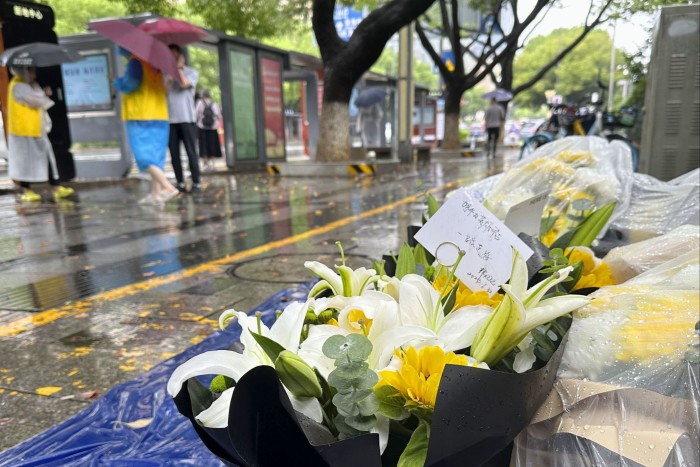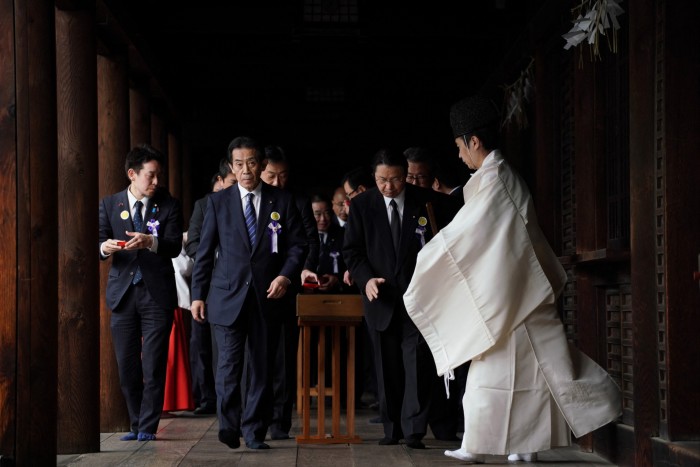
Unlock the Editor’s Digest for free
Roula Khalaf, Editor of the FT, selects her favourite stories in this weekly newsletter.
The death of a schoolboy in a knife attack this week has shaken the Japanese community in China, with Tokyo calling on Beijing to ensure the security of its nationals and some of the biggest Japanese companies offering to repatriate staff family members.
In a call with China’s vice-foreign minister Sun Weidong on Thursday, Japan’s ambassador Kenji Kanasugi “strongly urged” Beijing to share detailed information about the incident, which was the second targeted attack on Japanese schoolchildren in China in recent months.
He added that China must “ensure the safety of Japanese nationals, and to strengthen security at Japanese schools”.
Few details have been made available about the attack. The 10-year-old victim, who was identified by the surname Shen in a local police statement, was stabbed by a middle-aged man on Wednesday while walking to a Japanese school in China’s southern tech hub of Shenzhen. He died the following day while undergoing surgery.
It comes in the wake of an attack in June on a Japanese school bus in Suzhou near Shanghai. Both incidents have reignited concerns about anti-Japan sentiment in China, where state propaganda and online nationalists frequently stoke bitter memories of its neighbour’s second world war aggression.
The latest stabbing in Shenzhen occurred on the anniversary of Japan’s 1931 invasion of Manchuria, in northern China, a solemn event that is still commemorated in many Chinese cities with air raid sirens. It also came amid reports of knife assaults across China, including one in which four teachers from the US were injured.
In Suzhou, a Chinese attendant on a Japanese school bus died and a Japanese mother and child were wounded by a middle-aged assailant wielding a knife. Chinese police have released few details about the incident.

The violence has unnerved the Japanese community and companies, which are among the biggest foreign investors in the world’s second-largest economy. The Japanese embassy in Beijing has held emergency meetings with businesses, schools and other organisations to discuss what one foreign ministry official described as a “high level of worry” among Japanese expatriates living in China.
Carmaker Nissan said it had spoken “directly with expatriates . . . and their family members to address any concerns”, adding that it was checking “the safety management protocol of schools attended by children of Nissan expatriates”.
The world’s biggest carmaker by sales, Toyota, was taking similar actions while entertainment group Sony said it was “encouraging all expatriates to remain vigilant and pay attention to safety measures”.
Panasonic has offered to cover the costs of staff members’ families temporarily returning to Japan if they wished — echoing previous waves of anti-Japanese sentiment in China.
China’s foreign ministry on Thursday said it regretted the Shenzhen incident, adding that the boy was a Japanese national born to a Japanese father and a Chinese mother. It did not offer any further details.
It said China always welcomed “people from all countries, including Japan”.
Beijing has been trying to court international capital following a sharp fall in new foreign direct investment in recent months and as its slowing economy contends with lagging investor and business confidence.

The Japanese embassy’s comments section on Weibo, the Chinese microblogging site, teemed with messages of condolences this week.
“As a Chinese person, I am truly ashamed of the behaviour of my compatriots,” said one comment, which had received nearly 6,000 likes.
“The fundamental solution for the problem is to refrain from spreading anti-Japanese rhetoric,” said another commenter.
That comment drew some angry responses, however, with one suggesting that Japanese politicians’ actions contributed to anti-Japanese sentiment, referring to a history of visits to the Yasukuni Shrine, which honours Japanese military casualties, including war criminals.
Tensions between China and Japan are also escalating over Tokyo’s co-operation with the US on controls on high-technology exports, such as equipment for advanced semiconductors, to China. Japan has also deepened security co-operation with the US and its allies in the Pacific on flashpoints including Taiwan and maritime territorial claims.
This week, the Chinese navy sailed through a narrow strait between two of Japan’s southernmost islands, entering the Japanese contiguous zone — an area adjacent to its territorial waters — for the first time. This followed an unprecedented incursion by a Chinese military plane into Japanese airspace last month.
Chinese state media also launched a fierce campaign last year over Japan’s release of radioactive water from its stricken Fukushima Daiichi nuclear plant, despite most experts declaring it was safe.
But on Friday, China’s foreign ministry announced an agreement between the countries allowing Beijing to monitor the discharged wastewater. Japan’s Prime Minister Fumio Kishida said China had also agreed to gradually resume imports of Japanese seafood, which it had banned last year.
Nationalists on China’s social media regularly accuse celebrities or businesses of harbouring pro-Japan sentiment. Last year, Nongfu Spring, the country’s biggest bottled water brand, was targeted for allegedly using traditional Japanese designs in its packaging.